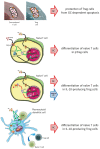Context-Dependent Effect of Glucocorticoids on the Proliferation, Differentiation, and Apoptosis of Regulatory T Cells: A Review of the Empirical Evidence and Clinical Applications
- PMID: 30845709
- PMCID: PMC6429178
- DOI: 10.3390/ijms20051142
Context-Dependent Effect of Glucocorticoids on the Proliferation, Differentiation, and Apoptosis of Regulatory T Cells: A Review of the Empirical Evidence and Clinical Applications
Abstract
Glucocorticoids (GCs) are widely used to treat several diseases because of their powerful anti-inflammatory and immunomodulatory effects on immune cells and non-lymphoid tissues. The effects of GCs on T cells are the most relevant in this regard. In this review, we analyze how GCs modulate the survival, maturation, and differentiation of regulatory T (Treg) cell subsets into both murine models and humans. In this way, GCs change the Treg cell number with an impact on the mid-term and long-term efficacy of GC treatment. In vitro studies suggest that the GC-dependent expansion of Treg cells is relevant when they are activated. In agreement with this observation, the GC treatment of patients with established autoimmune, allergic, or (auto)inflammatory diseases causes an expansion of Treg cells. An exception to this appears to be the local GC treatment of psoriatic lesions. Moreover, the effects on Treg number in patients with multiple sclerosis are uncertain. The effects of GCs on Treg cell number in healthy/diseased subjects treated with or exposed to allergens/antigens appear to be context-dependent. Considering the relevance of this effect in the maturation of the immune system (tolerogenic response to antigens), the success of vaccination (including desensitization), and the tolerance to xenografts, the findings must be considered when planning GC treatment.
Keywords: Treg cell number modulation; desensitizing treatment; glucocorticoids; human allergic diseases; human autoimmune diseases; peripherally derived Treg (pTreg) cells; regulatory T (Treg) cells; thymus-derived Treg cells (tTreg); tolerogenic response.
Conflict of interest statement
The authors declare no conflicts of interest.
Figures


References
-
- Oppong E., Cato A.C.B. Effects of Glucocorticoids in the Immune System. In: Wang J.-C., Harris C., editors. Glucocorticoid Signaling. Volume 872. Springer; New York, NY, USA: 2015. pp. 217–233. Advances in Experimental Medicine and Biology. - PubMed
-
- Nocentini G., Ronchetti S., Bruscoli S., Riccardi C. The Clinical Pharmacology of Past, Present, and Future Glucocorticoids. In: Cimaz R., editor. Systemic Corticosteroids for Inflammatory Disorders in Pediatrics. Springer International Publishing; Cham, Switzerland: 2015. pp. 43–58.
Publication types
MeSH terms
Substances
Grants and funding
LinkOut - more resources
Full Text Sources
Other Literature Sources
Medical
Miscellaneous

